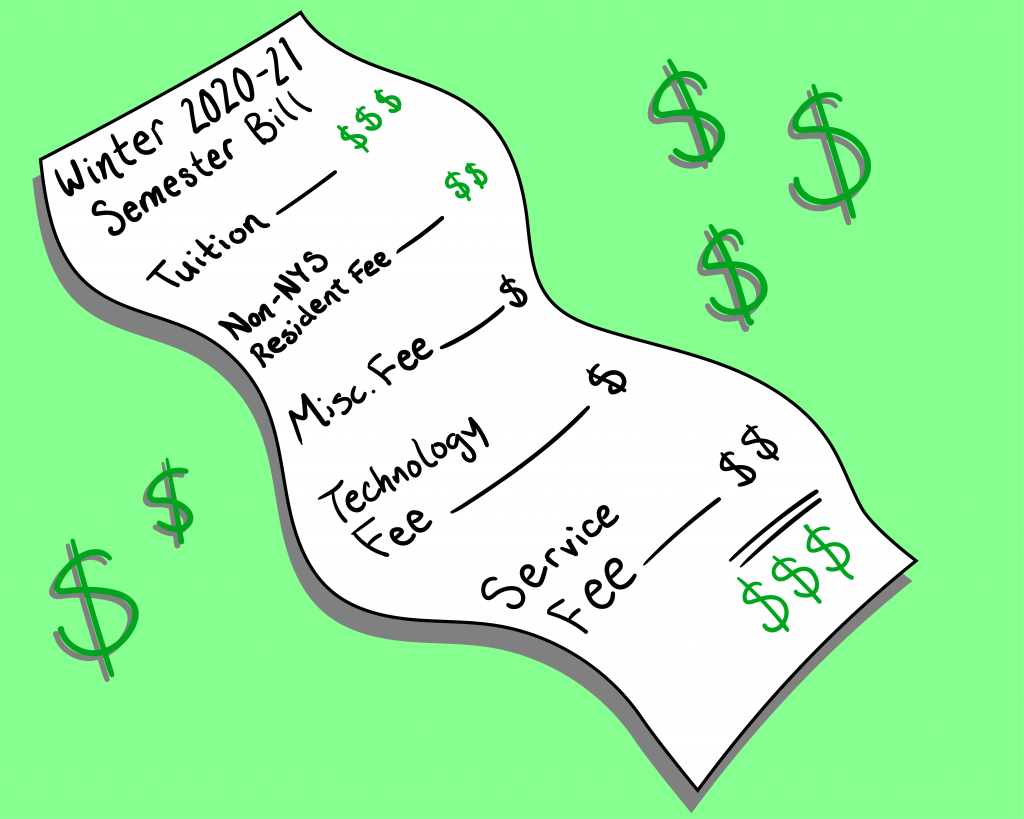Binghamton University students are signing up for winter courses, and some students may be in for a surprise when the bill arrives at the end of the winter session.
According to Ariel Liebb, a non-New York state resident and junior majoring in integrative neuroscience, the tuition fee for winter courses last year for non-New York state residents offered by the University was around $350 per credit hour. This would make the price for a standard four-credit class last winter $1,400. The University declined to comment and confirm this tuition fee for last year’s winter courses.
This year, according to the University, the price of winter session courses for the same students is $1,028 per credit hour. For one standard four-credit class, this brings the new total tuition for a month-long class to $4,112. For reference, according to the University, the price per credit hour for a New York state resident this winter is $295.
Liebb said he thinks this price change doesn’t make sense, especially given the fact that all winter classes this year are taking place online.
“Regarding an increase in tuition for an online course during a pandemic, I think it is sly,” Liebb wrote in an email. “An online course shouldn’t have a difference in tuition for out-of-state [students] versus in-state [students]. If you look at the summer courses there’s three different types of tuition. There’s New York state, out-of-state online and out-of-state in person. If the classes were in person, I would understand why there would be such a price increase, but, because it is online, there is no reason for such an increase.”
Jordan Weil, a non-New York state resident and senior majoring in political science, said he signed up for winter courses without being notified of the increase in price, and he no longer has the option to drop the classes because he needs the credits in order to graduate.
“I didn’t get any emails about it, and I wasn’t alerted about it,” Weil said. “They put me in a tough situation because I’m planning to go to graduate school after this, so it’s not like I can push this off for another semester. I don’t really have a choice. I have to take the classes.”
Alexis Gross, a non-New York state resident and junior majoring in music, said she was also not aware of this increase in price and may end up not taking winter courses due to it.
“I personally was unaware of the price changes to the winter session — I actually did not know the prices were raised until today,” Gross wrote in an email. “I have been planning on taking a course this winter, and, now knowing that the prices changed so drastically for this winter, I will definitely have to take the new price into consideration.”
Gross also expressed concern for people potentially affected by the pandemic. Gross said the increase in price did not make sense given the fact that students may already be struggling financially.
“Given the current situation with the pandemic, it is surprising to me that winter course prices would increase so much,” Gross wrote. “I know that COVID-19 has unfortunately left many people struggling financially, meaning that these courses may not be as accessible for people who would normally plan on taking them.”
Weil said making these changes during the COVID-19 pandemic could put a lot of students in situations where they cannot afford classes they may need to graduate. In order to afford the credits he needs to graduate, Weil said he may now have to work a job alongside his classes this winter.
“It’s more difficult now for people to pay for these classes because a lot of people have lost their jobs, and paying for school is just getting harder,” Weil said. “Usually during the winter semester I’d be working, but now I’m thinking about taking classes. With the price change, I might have to do both now because it’s a lot of money.”
Liebb said the timing for the change in tuition prices was unacceptable, and BU should be more aware about student’s potential hardships given COVID-19.
“Especially during a pandemic where many people lost jobs and people have more financial burdens, I think it’s wrong that they increased the rate,” Liebb wrote. “It’s sleazy.”



